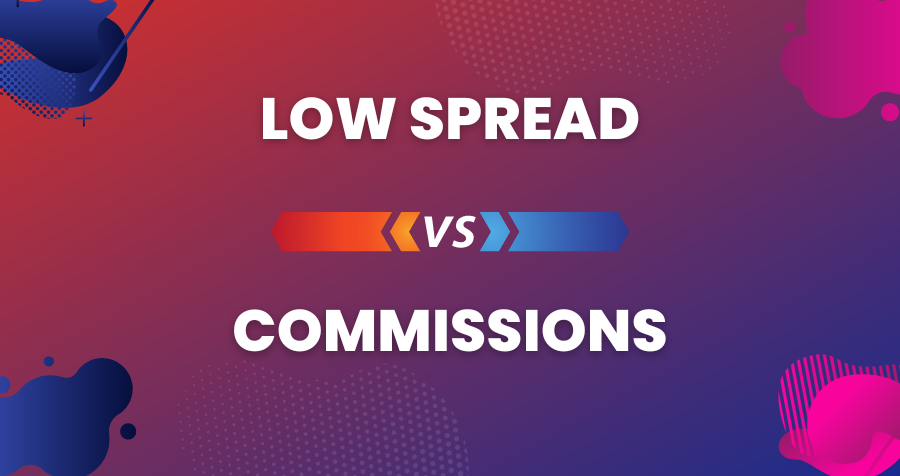When it comes to trading, traders have to consider several factors before deciding which broker to work with. Two of the most important factors are spreads and commissions. Spreads refer to the difference between the bid and ask price of a financial instrument, while commissions are fees charged by the broker for executing trades. In this article, we’ll explore the differences between low spreads and commissions, and which one is the better option for traders.

What are Spreads and Commissions?
Before we dive into the differences between low spreads and commissions, let’s define what each term means.
Spreads
Spreads are the difference between the bid and ask price of a financial instrument. The bid price is the highest price a buyer is willing to pay for an asset, while the ask price is the lowest price a seller is willing to accept. The spread is the difference between these two prices and is usually expressed in pips. For example, if the bid price for a currency pair is 1.1000 and the ask price is 1.1002, the spread is 2 pips.
Commissions
Commissions are fees charged by brokers for executing trades on behalf of their clients. These fees are usually a fixed amount per trade or a percentage of the trade’s value. Commissions can vary depending on the financial instrument being traded and the broker’s pricing model.
Low Spreads vs. Commissions: Which is Better?
Now that we understand what spreads and commissions are let’s explore the differences between them and which one is the better option for traders.
Low Spreads
Low spreads are ideal for traders who trade frequently and need to execute trades quickly. This is because low spreads mean that traders can enter and exit trades at a lower cost. Lower trading costs mean that traders can make more profits from their trades, especially if they trade frequently.
Commissions
Commissions are a better option for traders who trade less frequently and hold positions for longer periods. This is because commissions are usually charged as a fixed amount per trade or a percentage of the trade’s value. This means that traders who hold positions for longer periods won’t be affected by the cost of the commission as much as traders who trade frequently.
Which is the Better Option?
The answer to this question depends on the trader’s trading style and the financial instrument being traded. For traders who trade frequently, low spreads are the better option because they can execute trades at a lower cost. On the other hand, for traders who trade less frequently, commissions are the better option because they won’t be affected by the cost of the commission as much as traders who trade frequently.
Pros and Cons of Low Spreads and Commissions
Let’s explore the pros and cons of low spreads and commissions in more detail.
Low Spreads
Pros
- Lower trading costs
- Ideal for frequent traders
- Allows for quick execution of trades
Cons
- Not suitable for long-term traders
- May be affected by market volatility
Commissions
Pros
- Fixed cost per trade
- Ideal for long-term traders
- Not affected by market volatility
Cons
- Higher trading costs
- Not suitable for frequent traders
Conclusion
In conclusion, low spreads and commissions both have their pros and cons, and the best option depends on the trader’s trading style and the financial instrument being traded. For frequent traders, low spreads are the better option because they allow for quick execution of trades at a lower cost. On the other hand, for long-term traders, commissions are the better option because they have a fixed cost per trade and are not affected by market volatility.
FAQs
1. Are low spreads always better than commissions?
Low spreads are not always better than commissions. The best option depends on the trader’s trading style and the financial instrument being traded. For frequent traders who need to execute trades quickly, low spreads are the better option. However, for long-term traders who hold positions for longer periods, commissions are the better option.
2. Can I negotiate commissions with my broker?
Yes, some brokers allow traders to negotiate commissions. However, the negotiation process may depend on the broker’s policies and the trader’s trading volume.
3. How do I know if a broker has low spreads or commissions?
You can check a broker’s website or trading platform to see their spreads and commission rates. Alternatively, you can compare multiple brokers to find the one that offers the best spreads or commissions for the financial instrument you want to trade.
4. Can I have both low spreads and low commissions?
Yes, some brokers offer both low spreads and low commissions. However, it’s important to read the broker’s terms and conditions to ensure that there are no hidden fees or charges.
5. What other factors should I consider when choosing a broker?
In addition to spreads and commissions, traders should also consider other factors such as the broker’s reputation, trading platform, customer support, and regulatory compliance. It’s important to choose a broker that meets your specific needs and trading goals.
